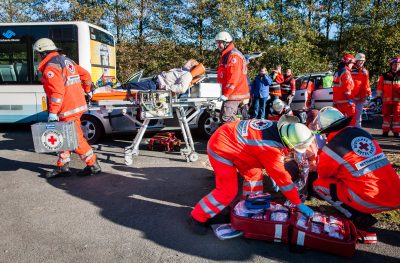The Importance of First Aid Training in the Workplace

Beyond Compliance: Why Manufacturing Industries Should Embrace Behaviour-Based Safety Implementation Programs
September 20, 2025
Transportation Route Risk Assessment and Logistics Safety Audit
September 23, 2025First aid training is a critical component of workplace safety, providing employees with the skills and knowledge needed to respond effectively to injuries and medical emergencies. The Safety Master emphasizes the significance of first aid training, as it not only ensures immediate assistance to the injured but also fosters a safer and more prepared work environment. This article explores the importance of first aid training in the workplace, supported by statistics on workplace injuries and legal requirements.
The Necessity of First Aid Training
First aid training equips employees with the ability to handle medical emergencies, potentially saving lives and minimizing the severity of injuries. Here are several reasons why first aid training is essential in the workplace:
Immediate Response to Injuries
In the event of an injury, the first few minutes are crucial. Prompt and appropriate first aid can significantly reduce the severity of an injury, prevent complications, and enhance the chances of recovery. Employees trained in first aid can provide immediate care while waiting for professional medical assistance, which can be lifesaving in critical situations.
Reducing Workplace Injuries
Proper first aid training helps in creating a safer work environment. Employees become more aware of potential hazards and are better equipped to prevent accidents. This proactive approach reduces the incidence of workplace injuries, contributing to overall safety and productivity.
Legal Compliance
Many countries have legal requirements for workplace safety, including provisions for first aid. Employers must comply with these regulations to avoid penalties and ensure a safe working environment. The Occupational Safety and Health Administration (OSHA) in the United States, for example, mandates that employers provide adequate first aid supplies and training. Compliance with these regulations demonstrates a company’s commitment to employee well-being and legal responsibility.
Enhancing Employee Morale
A workplace that prioritizes safety and provides first aid training fosters a culture of care and concern. Employees feel valued and secure knowing that their employer is invested in their safety. This, in turn, boosts morale, job satisfaction, and productivity.
Statistics on Workplace Injuries
Understanding the prevalence and impact of workplace injuries underscores the importance of first aid training. Here are some key statistics:
- According to the International Labour Organization (ILO), there are approximately 340 million occupational accidents and 160 million victims of work-related illnesses annually worldwide.
- In the United States, the Bureau of Labor Statistics (BLS) reported that private industry employers reported 2.8 million nonfatal workplace injuries and illnesses in 2019.
- The Health and Safety Executive (HSE) in the UK noted that 693,000 workers sustained non-fatal injuries at work in 2019/20, with 65,427 injuries reported under RIDDOR (Reporting of Injuries, Diseases and Dangerous Occurrences Regulations).
- The most common causes of workplace injuries include slips, trips, falls, overexertion, and contact with objects and equipment.
These statistics highlight the critical need for effective first aid training to mitigate the impact of workplace injuries.
Implementing First Aid Training
To ensure a successful first aid training program, consider the following steps:
1. Assess Workplace Risks
Conduct a thorough risk assessment to identify potential hazards and determine the specific first aid needs of your workplace. This assessment should be part of your overall Process Safety Management (PSM) strategy.
2. Select Appropriate Training
Choose a reputable provider for first aid training. The Safety Master offers comprehensive training programs tailored to meet the specific needs of different industries. Ensure that the training covers essential topics such as CPR, wound care, and handling common workplace injuries.
3. Regular Refresher Courses
First aid skills can diminish over time. Schedule regular refresher courses to keep employees’ knowledge and skills up to date. This is particularly important for maintaining compliance with legal requirements and ensuring ongoing preparedness.
4. Equip the Workplace
Ensure that the workplace is equipped with adequate first aid supplies, including kits and equipment. Conduct regular inspections and audits to verify that these supplies are well-stocked and accessible. Integrating first aid preparedness with a comprehensive Fire Audit ensures all emergency preparedness measures are in place.
5. Promote a Safety Culture
Encourage a culture of safety by integrating first aid training with other safety initiatives such as Process Safety Management Training. This holistic approach emphasizes the importance of safety across all aspects of the workplace.
Legal Requirements
Compliance with legal requirements is essential for workplace safety. In addition to OSHA in the United States, other countries have specific regulations for first aid in the workplace. For instance:
- The UK’s Health and Safety (First Aid) Regulations 1981 require employers to provide appropriate first aid equipment, facilities, and personnel.
- In Australia, the Work Health and Safety (WHS) Regulations mandate that employers ensure the provision of first aid equipment and training.
Adhering to these regulations not only ensures legal compliance but also promotes a safer and more secure workplace.
Conclusion
First aid training is a vital component of workplace safety, providing immediate assistance during medical emergencies and fostering a safer work environment. By reducing workplace injuries, ensuring legal compliance, and enhancing employee morale, first aid training proves to be a worthwhile investment for any organization. The Safety Master advocates for comprehensive first aid training as part of an overall safety strategy, integrating it with Process Safety Management and other safety initiatives to create a holistic approach to workplace safety. Prioritizing first aid training is a crucial step towards safeguarding the health and well-being of employees and ensuring a resilient and prepared workforce.




